- Home
- Sharon Ashwood
Enchanted Warrior Page 2
Enchanted Warrior Read online
Page 2
The instant her magic rose to strike back, his mouth dropped open and he pulled away as if she’d stung him. He recovered in a heartbeat, though now he was clearly wary.
He grabbed her wrist, glaring at the tattoo as if he hadn’t noticed it before. “Witch,” he said in a low, threatening growl.
Tamsin turned cold at the word. Most thought witches were extinct, and the covens preferred things that way. But her temper was roused, and she pulled away, heat mounting in her cheeks. “Felt that, did you? I think you’ve got a touch of the blood yourself. You certainly have impressive shields.”
“No.” He said it with fierce finality. All trace of softness was gone from his face, reducing it to bloodless, harsh angles. “Now you will tell me what I want to know.”
“I don’t know where the tombs are,” she snapped. “I’ve already tried to locate some of the artifacts that should be in the church, but the old owner died and the information was lost. What paper records they have here are a mess. That’s why the new owners have hired me—to figure all this out.”
Silence hung heavy between them, and his face darkened again, promising thunder. “Then have answers for me the next time we meet.”
“And why would I do that for you?” Her temper was up and the words out before she could stop herself. Her gut knotted, bracing for the backlash.
“Because scholars like riddles, witchling, and there is a cost if you fail to find the answer.” Gawain wheeled and headed for the door.
Alarmed, Tamsin followed only to see him clear the steps in one graceful leap.
“Wait!” What consequences? How did he know about witches, anyway? And what was the big deal about the tombs? But by then, Gawain had disappeared into the throng, gone as fast as he’d burst into her universe.
Urgently needing to sit, Tamsin sank to the cold steps, suddenly shaking. “By Merlin’s pointed hat,” she muttered, and wondered if historians ever got hazard pay.
Chapter 2
Flushed with temper, Gawain stormed away from the Church of the Holy Well. He rounded the edge of a green-and-gold pavilion and slipped into the stream of foot traffic passing by—or rather, he tried to. Business had picked up in the theme park and crowds filled the pathways, slowing progress to a crawl. Bright tents and fluttering pennons conjured a vision of the past—but it was an image distorted by a fractured mirror. Medievaland was nothing like the world Gawain remembered.
He cursed, shouldering his way through a knot of tourists. He was a knight of the Round Table and friend and relation to the great Arthur of Camelot. He’d sacrificed everything when he’d agreed to this mission—his family, friends, rank and authority—but it had been the right thing to do. The men and women of this present day were innocents who had never seen actual monsters. If he did his job properly, they would stay that way.
However, to use a modern phrase, sometimes his job sucked. Today, it sucked more than usual because his entire quest was in ashes. The tombs were gone, and they were key to stopping Camelot’s enemies. Gawain had heard whispers of witches and fae plotting in the shadows. The doomsday that Arthur had foreseen—and that had inspired the entire plan to put the Round Table into the stone sleep—was almost upon them.
Worse, the information he needed to find the tombs was in the hands of a very pretty witch who inspired thoughts of bedchamber revelry. Tamsin Greene—a witch’s name if there ever was one—was a fair beauty, long legged and slender with a silver-blond braid that fell to her waist. Most would call her beautiful—exquisitely so—but that description missed the best part of her. The young woman’s big brown eyes had been cautious and bold by turns, as challenging as a clever swordsman testing his guard. Everything about her had stirred his blood until he’d felt her power and seen the mark on her wrist. It meant she was a sworn member of a group of witches, bound to them by blood and magic.
The situation could not get more complicated. He half believed her claims of ignorance, although it could not be a coincidence that he’d found a witch on duty at the spot where the huge stone tombs had mysteriously vanished. No, lovely as Tamsin was—and lonely as he was—witches were dangerous. Gawain knew that firsthand. His own mother had been the worst.
Tamsin’s words came back to him with the cold chill of a nightmare: I think you’ve got a touch of the blood yourself. That was his horror and his shame. He’d spent a life in service to his king, spilling his witch-tainted blood over and over in an effort to cleanse it. Five minutes in the company of the little historian, and she’d found his flaw. Ten, and he might have been dragged down into the claws of sorcery once more, a corrupted victim of his bloodline unable to control his own intrinsic evil.
Gawain strode with his head down so he didn’t have to look around. A juggler passed by, then a foam dragon wearing a sandwich board that advertised a joust. All the employees were in cheap costumes, some even sporting fake crowns, as if they were kings and queens of the hot dog stands. There was a dread fascination to it all, as if history had experienced a terrible accident.
“I can’t make up my mind if this is a logical place to see a knight of Camelot, or a peculiar one.” The voice was as cool and precise as a honed blade.
Gawain froze, every muscle readying for a fight. Then he saw the speaker, and his alarm turned to a cautious surprise. “Angmar of Corin.”
“The same.” The figure raised his hands, showing he was unarmed. “I come in peace.”
Angmar was dressed in jeans and a thick sweater and leaning against one of the faux-rustic pillars supporting the thatched roof of a concession stand. The modern clothes made Gawain blink. Angmar was one of the faery folk, so tall and thin that he was almost gaunt. His skin was a warm brown that contrasted sharply with bright green eyes and long white hair. Though his face was young, something in his eyes spoke of centuries past.
The fine hairs on Gawain’s neck rose. Even in the chaos of the crowded fairground, he could feel Angmar’s power. It was as different from the pretty witch’s as a broadsword was from a kitchen knife, and the fae—once allies—were now sworn enemies of Camelot.
Angmar narrowed his eyes and tapped his chin with a long forefinger. “Surely you’re not here for the bouncy castle.”
Gawain gave a bitter laugh. “Maybe Medievaland suits me.”
With a faint smile, Angmar closed the distance between them. “You are a prince of Lothian and the Orkney Isles. You’re above all this.”
For a moment they studied each other, both outsiders caught in a world utterly different from where they belonged. Gawain had never known Angmar well. Fae lived by different rules and rarely came to Arthur’s court, but finding him here created unexpected common ground.
“I thought your kind had gone to the Hollow Hills and left the mortal world behind,” said Gawain.
“We came back—and so, apparently, did you.” Angmar straightened, pushing his hands into his pockets in a curiously casual gesture. His tone was cordial, as if discussing the weather. “I’ve been watching the church. The fae know that Merlin bespelled the knights of Camelot into an enchanted sleep. It was a clever spell Merlin wove, and a daring move by your king. Especially daring as he had just ordered Merlin into exile. A bit like arguing with your barber during a shave.”
Gawain didn’t answer. He remembered the day the spell was cast: lying on the cold tomb, shivering as he waited to be turned to stone. Remembered the crushing weight of his lungs as they froze in place. Remembered the clawing terror of suffocation, of the sudden savage need to escape just as his consciousness winked out. He sucked in a deep breath, barely repressing a shudder.
Angmar watched his expression with open curiosity, looking away only when a pair of roughhousing boys shoved their way past. “It’s long past time for the Round Table to awake. Where are your brothers in arms?”
“Why? Are the fae so impatient to take revenge on us
that they sent you to make a wake-up call?”
“Merlin’s spell injured us more than you know,” said Angmar, his voice now tinged with anger. “But I’m not here to discuss that. I have a warning for you. Assemble your fellow knights, because LaFaye and Mordred are on the move. The war Arthur foresaw is here.”
Gawain flinched. King Arthur’s vile stepsister, Morgan LaFaye, had brought Camelot to its knees. Her chief conspirator had been her son, Mordred. Both were powerful, with witch and fae blood mixed in their veins.
“What is their interest in this fight, besides an opportunity to cause chaos?” Gawain said, tension ruffling the hair at his nape. “How is this war connected to them?”
They fell into step, wandering shoulder to shoulder down the pathway between the booths. The sweet scent of frying dough curled through the air. Gawain’s mouth watered, but he ignored the hunger gnawing his gut.
“You have been asleep.” Angmar cast him a narrow glance. “After you and your companions turned to stone, Morgan LaFaye staged a coup and took the crown of Faery.”
“She did what?” Gawain snarled.
“It’s not so strange as you may think. Her father was one of us.” Angmar frowned. “Afterward, she bided her time for centuries, consolidating her hold on the throne. Ten years ago, she began plotting a campaign against the mortal realms. Then a few months ago, she gave the final order to infiltrate this world. She claims she wants justice, but I say she simply wants more power.”
Angmar’s tale explained why Gawain had risen when he did—probably it was the same moment when the first of the fae had touched mortal ground. “Those are evil tidings.”
“It gets worse. She’s put Mordred in charge of the campaign,” said Angmar.
Pure fury surged through Gawain, robbing him of sight for an instant. LaFaye was bad, but Mordred was a snake without conscience. He was also Gawain’s cousin—proving one could never pick one’s relations.
Angmar went on. “Mordred is using stealth, not armies, and his first priority is finding the tombs to stop the Round Table from rising. You need to find your friends and wake them at once.”
“By all the saints!” Gawain’s vision went red, but he held on to his temper. He needed his wits, not the fury of battle. Then he took a deep breath, turning back to the fae. He had a thousand questions but settled on the most immediate. “Why are you warning me?”
Angmar shrugged, but lines of tension framed his mouth. “Not all the faery kingdom has forgotten who we are. My people love beauty and justice. We are not indiscriminate murderers, and we should not be Mordred’s toy soldiers. Those of us who have resisted his power are turning to the Round Table to ensure our freedom. Merlin created this situation. In some measure, Arthur and Camelot bear that responsibility.”
“Why trust us? Why not overthrow Mordred and his mother yourselves?”
“The rebel fae are scattered, disorganized, and afraid. We need Camelot’s leadership and its might.”
The words were barely out of the faery’s mouth when a black-feathered arrow whistled past, striking the side of a barrel. It was short and thick, a crossbow bolt rather than a true arrow. Angmar jerked aside, breath hissing between his teeth. A thin line of blood bloomed across the front of his sweater. Gawain grabbed his arm, pulling him behind a Dumpster.
A quick glance told Gawain the shot had gone unnoticed among the hubbub of the crowd—and an archer strolling through Medievaland would hardly be noticed. The assassin had chosen the perfect place to do his work. A second glance at the arrow told him it was faery craftsmanship.
“Was that for dramatic effect?” Gawain asked drily. “A little extra push to make me agree to help you?”
“No.” Angmar clutched the front of his sweater, red oozing from between his fingers. “I thought I’d dodged Mordred’s lackeys. If they know I’ve warned you, they will silence us both.”
“Let them try.” Gawain pulled Angmar’s hand away to see the sweater had been sliced by the bolt’s passage. Through the gap in the cloth, he could see the injury was long but shallow. As long as the tip wasn’t poisoned—and one never knew with faery weapons—Angmar would survive. Gawain shed his jacket, stripped off his shirt and pressed the wadded fabric against the wound. “Hold that. It only grazed you.”
Angmar obeyed while Gawain pulled on his jacket again. “One would think you’d done this before,” the faery said drily.
“Can you walk?” Gawain asked by way of reply.
“Yes.”
“Good. You need cover. I need a word with the archer.”
As Gawain peered around the corner of the Dumpster, he could see crowds packed the sidewalks, half of them children. He was more than willing to fight, but not where innocents could be harmed. But as he reached for his sword, his hand closed on empty air. He swore viciously. Of course he wore no sword. Every instinct he possessed was centuries out of date.
Angmar gave him a feral grin, drawing a gun from a holster beneath his jacket. “This time has different ways to kill, Sir Knight.”
“Perhaps,” Gawain growled. “But there are laws in this age that will make this awkward. We cannot do honest battle here in the open, where all can see.”
“So true.” With a graceful flick, Angmar drew a shape in the air that burst in a blaze of rainbow light. The same instant, everything froze, the sound of the fair cutting off as if shears had sliced it. Time itself had stopped. A juggler’s clubs hung in the air. Fluttering pennons stilled as if they were painted against the sky. Only Gawain and Angmar still moved. “This should make things easier.”
Gawain moved to help Angmar to his feet. The faery shifted awkwardly with the bundle of shirt pressed against his stomach. Despite the shallow cut, it was soaking through. Gawain gave up the effort to move him. “How long can you hold the spell?”
“Longer if you do the chasing.” Angmar pressed the Smith & Wesson into Gawain’s hand, holster and all. “Leave me here and go quickly.”
Gawain buckled it on and turned to go, but the fae caught his sleeve. “One thing more.”
Gawain turned. “What?”
Angmar’s face went rigid, as if he pushed down an inner storm. “I said Merlin’s spell changed the fae. This assassin is no doubt one of us. Do not expect compassion or mercy or any feeling at all. My people are no longer capable of it.”
For an instant, Gawain forgot everything but the faery’s words. “How did Merlin’s spell hurt you? Arthur would never say.”
Angmar’s face twisted. “The magic tore away our souls. A few of us escaped—I was not at the battle when the spell was cast—but the rest of my people are damaged beyond recognition. The new queen has used that to turn us into monsters for her war. We need Camelot’s protection to keep us from becoming the stuff of nightmares.”
Gawain stared as he remembered Angmar’s words: My people love beauty and justice. We are not indiscriminate murderers, and we should not be Mordred’s toy soldiers. Horror crept over him as the enormity of their plight became clear.
The faery gave him a gentle push. “Now go, and do what you can to save us. All of us.”
Numb with shock, Gawain ran along the strip of grass that wound behind the pavilions, searching the possible vantage points where the archer might be hiding. Concentration cleared his thoughts. The angle of the bolt had been low, suggesting the bowman had been on the ground rather than a rooftop. Moving cautiously, Gawain approached the most likely spot from behind.
Gawain ducked beneath a sparrow that had been caught midflight by Angmar’s spell. It was eerie, passing through the still and silent fairground. The packed sidewalks were filled with living statues. A child had been blowing bubbles, and they hung in the air like iridescent jewels. Gawain was struck with wonder, but he had too much experience to let down his guard. The bowman might be frozen like the rest of the crowd, and the
n again he might not. With every motion, Gawain was making himself an obvious target.
He was right to be cautious. He heard the snap of the crossbow’s mechanism just as a black-feathered bolt streaked his way. Split-second reflex made him dive to the side. He rolled to his feet in one smooth motion and began sprinting in the direction from which the arrow had come. It was a dangerous move, but he counted on the fact that crossbows were slow to load.
Gawain should have known in this day and age an assassin would also carry a gun. He was still weaving through a family frozen in place when he heard the shot, loud as a thunderclap in the silence.
The assassin had fired straight into the crowd. All Gawain could do was cover the child beside him and let the bullet pierce his own flesh. It ripped along his arm like a savage claw, tearing through cloth and skin. He hit the ground, the child beneath him. Gawain scrambled to his feet, bringing up his own weapon just as he saw a dark-clad figure slip away.
The enemy was using the crowd as cover. Cursing, Gawain shouldered through the fairgoers. Blood slid between Gawain’s fingers as fiery pain washed his vision with a red haze. “Hold, coward!”
The figure’s dark head bobbed through the frozen tableau. Gawain followed him down a long alley of merchants—bakers, leatherworkers, calligraphers, and an armorer’s booth. As he passed the armorer, Gawain palmed a blade as he went by and holstered Angmar’s gun. He needed his injured right arm to shoot straight, but he’d trained since boyhood to use a blade with either hand.
He’d barely gone another dozen yards before he realized they were heading in a circle. The place where Gawain had left Angmar was just ahead. He heard a whisper of movement from the left and another bolt hissed past his ear, missing by a fraction. Gawain smiled, a brief, deadly flash of teeth. The shot had given the enemy’s position away. In a fluid motion, Gawain threw the knife. He dove forward, using the side of a hut for cover.

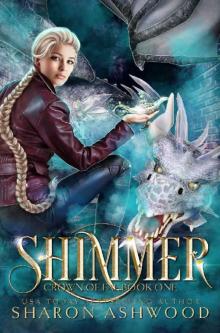 Shimmer
Shimmer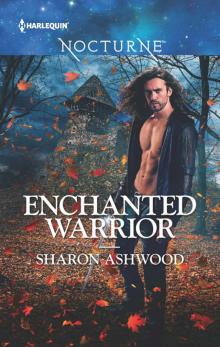 Enchanted Warrior
Enchanted Warrior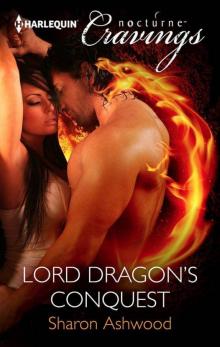 Lord Dragon's Conquest
Lord Dragon's Conquest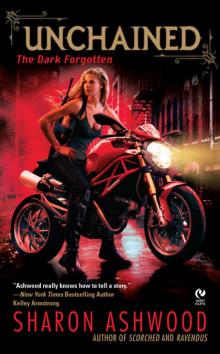 Unchained tdf-3
Unchained tdf-3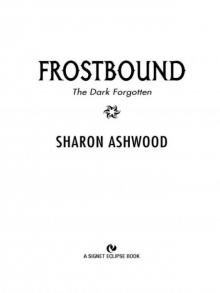 Frostbound
Frostbound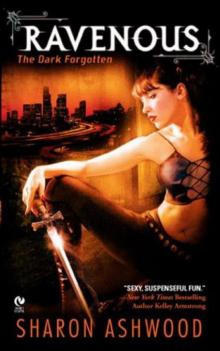 Ravenous tdf-1
Ravenous tdf-1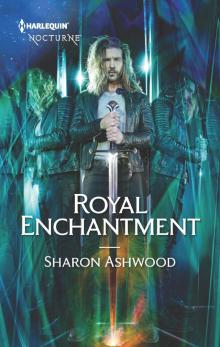 Royal Enchantment
Royal Enchantment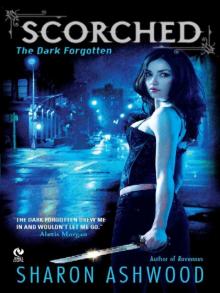 Scorched tdf-2
Scorched tdf-2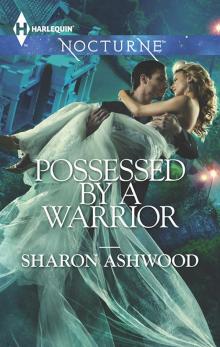 Possessed by a Warrior
Possessed by a Warrior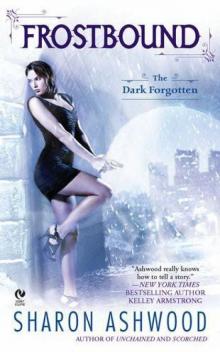 Frostbound tdf-4
Frostbound tdf-4 Enchanted Guardian
Enchanted Guardian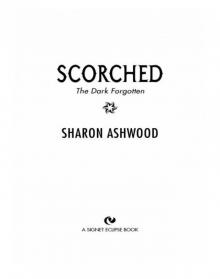 Scorched
Scorched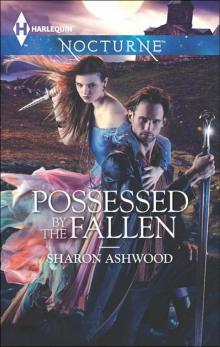 Possessed by the Fallen
Possessed by the Fallen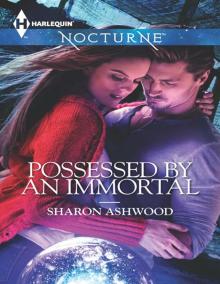 Possessed by An Immortal
Possessed by An Immortal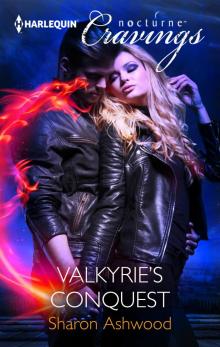 Valkyrie's Conquest
Valkyrie's Conquest